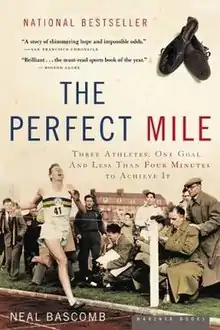The Perfect Mile
The Perfect Mile: Three Athletes, One Goal, and Less Than Four Minutes to Achieve It (2004) by Neal Bascomb is a non-fiction book about three runners and their attempts to become the first man to run a mile under four minutes and their first subsequent head-to-head competition. The runners are Englishman Roger Bannister, American Wes Santee, and Australian John Landy.
 Cover of paperback, depicting Roger Bannister breaking the 4 minute mile record | |
| Author | Neal Bascomb |
|---|---|
| Country | United States |
| Language | English |
| Genre | Non-fiction |
| Publisher | Mariner Books |
Publication date | 2004 |
| Pages | 344 |
| ISBN | 0-618-56209-5 |
| OCLC | 54001404 |
| Preceded by | Higher: A Historic Race to the Sky and the Making of a City |
| Followed by | Red Mutiny: Eleven Fateful Days on the Battleship Potemkin |
June 21, 1954: Less than six weeks after Bannister’s historic feat, Australian John Landy runs 3:58 at a track meet in Finland, throwing down the gauntlet.
August 7, 1954: The Empire Games in Vancouver, Canada, pits the two titans against one another in an event billed the “Miracle Mile.”
The Perfect Mile (also called the Miracle Mile) is not against the clock, rather it is what was required in heated competition between John Landy and Roger Bannister.
Reception
The New York Times' review calls it an "enthralling book" and says Bascomb "expertly winds up the tension of the three men's many failed attempts to get closer to the magic mark, before Bannister wrote himself into legend first on a windy day at the Oxford University track".[1]
Quotations
Direct quotations from the book:
“Move your bloody arms.... Too slow! Too slow! ... Come on, you lazy bastards! You’re hopeless bloody dogs! Children could run faster than that!”
“Good distance runners had to be made.”
“Sure he ran well against the clock. But did he have the ability to win in heated competition?”
“The possibilities in racing tactics are almost unlimited, as in a game of chess, for every move there is a counter, for every attack there is a defense.... The runner’s greatest asset, apart from essential fitness of body, is a cool and calculating brain allied to confidence and courage. Above all, he must have a will to win.”
“In any running event, you are absolutely alone. Nobody can help you. But short races are run without thought. In very long races you must go a great distance simply to be present in the laps that really count. But almost every part of the mile is important -- you can never let down, never stop thinking, and you can be beaten at almost any point. I suppose you could say it is like life. I had wanted to master it.”
“Now bid me run, and I will strive with things impossible.”
“It is not simply to write a technical treatise in which the performer is dissected like some laboratory specimen.... It is much more. It is heat and fire, drama and high excitement. It is victory and disaster. It is perspiration and the pungent whiff of liniment. It is the roar of the crowd.... Above all, it is recapturing for the reader the supreme effort of the athlete -- the very heartbeats of the particular triumph or tragedy the reporter is striving to word-paint.”
References
- Horspool, David (May 2, 2004). "Breaking Away". New York Times. Retrieved 2009-02-15.